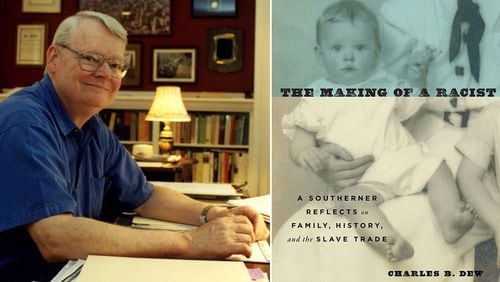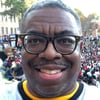From the time Charles Dew was a toddler in 1930s Florida, he was groomed to be a racist.
The Ephraim Williams professor of American History at Williams College tries to illustrate that on the cover of his latest book, “The Making of a Racist: A Southerner Reflects on Family, History and the Slave Trade.”
Among his first memories are sitting on his mother’s lap listening to her read him stories like “Ezekiel,” who lived on “de St. John’s Ribber.”
» Tell the AJC about your experience of race
Dew, who wrote that his mother, Dear, had a “luminous quality,” about her “gentle, caring nature,” would read the books to him in dialect. Then they would sing.
“Away down in Sanford, Florida dar lives a lil’ cullerd boy, an’ he names Ezekiel. And’ did boy he live wid his Pappy an’ he Mammy an’ he Sister Emancipation, an’ he brudder Lil’ Plural an’ Assafetida, de baby.”
“The names. The books poked fun at African-American speech, dress and actions. And literally, my first conscious memories were her reading these stories to me,” Dew said this week.
When Dew’s mother died in 1991 and he was cleaning her house, he found “Ezekiel” on a bookshelf.
“I was filled with memories of sadness over my mother’s death,” Dew said. “But then I opened the book and was appalled. I couldn’t believe that this was read to me by my mother. The whole experience from the time stuck with me subconsciously. When you learn not to shake hands with black people. When you learn that there are glasses in the house for (black domestic workers) to use that you are not to use. You do absorb and come to a belief system based on it.”
Dew will talk about all of that and more at 6 p.m. Thursday during a lecture and discussion about his book at The Center for Civil and Human Rights in downtown Atlanta.
But before that, he chatted with The Atlanta Journal-Constitution. (The interview has been edited for clarity and length.)
Why is this book needed?
Unfortunately, it is timely topic. With the election of President Obama in 2008, a lot of us naïvely believed that we had gone beyond playing the race card. But the last presidential campaign put it back in the middle of our national conversation. I teach southern history, so I probably should have known better. Race is not a regional problem, it is a national problem.
What did we miss over the last eight years?
A lot of us believed that we had crossed a threshold, cleared a hurdle. We anticipated that a lot of positive things would come. But Obama’s presidency angered a lot of people who were probably already bigoted and prejudiced and quiet about it. Having a president who was African-American and a member of a political party gave them cover to say that they were not racists and that it is all about politics.
How did you come up with the title of the book?
I had originally titled it, “The Making and Unmaking of a Racist.” But a colleague said I should make the title more direct about how I grew up white in Jim Crow and how I absorbed it. You can’t minimize the fact that this attitude toward race gets passed down from one generation to the next. It took the redemptive part of the title away and left me with the stark reminder of how I had grown up and how long it took me to get out of that culture. I was 17 years old the first time I came north of the Mason-Dixon Line. I am still astonished now at the time it took me. That whole notion of white supremacy is powerful and alluring.
What was your family like growing up in St. Petersburg, Fla.?
My father, Jack Carlos Dew, was a lawyer and he went to the University of Virginia for undergrad and law school. My mother, Amy Meek Dew, was Episcopalian and deeply religious. What I learned from watching them and how race played out, was that there were certain rules in how whites and black interacted. It was a racial etiquette. We didn’t use Mr. or Miss with black people. We didn’t shake their hands. Conversations were not controversial but rather inconsequential. You just go through a series of behavior patterns and think this is the way it is supposed to be. My mother said black folks were happy on their side of town and we were happy on our side of town and that is how it was meant to be. The message was that the people who worked for us were different from us and the people who were white were better. It was a message that you absorbed almost on a daily basis in the Jim Crow south.
Although you changed the original title, when was the “unmaking” of a racist?
It came when I was 17 at Williams College in 1954. I had an African-American classmate who lived in my dorm. It was the first time I ever had someone across the color line who was equal to me. I remember one day I was telling a dialect joke as he came in. He was humiliated and I was humiliated. I made it a point over the next day to introduce myself and talk to him. That was the first time I ever had a normal conversation with an African-American that was not bound by those rules. It was an evolutionary process. It was a combination of having a perspective on things that I don’t think I would have gotten had I stayed in the South. Physically, I had to distance myself from the South.
Did you ever address any of this with your parents?
I had a blow up with my father the spring semester of my senior year. He was a lawyer, but he never accepted Brown (vs. Board of Education, the Supreme court decision desegregating schools). He thought that it was a travesty and he complained bitterly. He started in about it at dinner. I said ‘Pop, Brown is clearly covered by the 14th Amendment. I think I know more about constitutional law than you do.’ You should not say that to your father in 1958. He got silent. When I got back to school my mother called and said I should apologize. I weighed the pros and cons. I loved him. He was a good father and I didn’t want this irreparable breach so I called and apologized. But from then on we never raised the subject of race again.
What do you hope this book will accomplish?
I thought that there were not enough white voices in our racial dialogue. We have had some incredible, powerful black voices like W.E.B. Du Bois, James Baldwin and Ta-Nehisi Coates. But not enough from the white side and it is important that we do so in the hope that it would resonate with others. When I would teach, I would tell stories of how I grew up. Everybody was focused on me. I had their undivided attention. Maybe that feeling was worth talking about and believing. I have spoken publicly a lot and something has happened that I didn’t anticipate. A number of African Americans have thanked me and said they never understood where this stuff came from. How did this happen? Where did it come from?
About the Author







